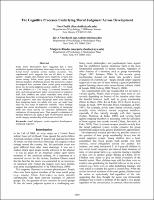Please use this identifier to cite or link to this item:
https://hdl.handle.net/20.500.12202/4428Full metadata record
| DC Field | Value | Language |
|---|---|---|
| dc.contributor.author | Chalik, Lisa | |
| dc.contributor.author | Rhodes, Marjorie | |
| dc.contributor.author | Van Bavel, Jay J. | |
| dc.date.accessioned | 2019-06-19T23:08:44Z | |
| dc.date.available | 2019-06-19T23:08:44Z | |
| dc.date.issued | 2018 | |
| dc.identifier.citation | Chalik, L., Van Bavel, J., & Rhodes, M. (2018). The cognitive processes underlying moral judgment across development. Proceedings of the 40th Annual Conference of the Cognitive Science Society, 1461-1466. | en_US |
| dc.identifier.uri | https://cognitivesciencesociety.org/wp-content/uploads/2019/01/cogsci18_proceedings.pdf | en_US |
| dc.identifier.uri | https://hdl.handle.net/20.500.12202/4428 | |
| dc.description | Scholarly research article | en_US |
| dc.description.abstract | Some moral philosophers have suggested that a basic prohibition against intentional harm ought to be at the core of moral belief systems across human societies. Yet, experimental work suggests that not all harm is viewed equally—people often respond more negatively to harm that occurs among fellow social group members, rather than between members of different groups. The present two studies investigated how concerns about social group membership factor into the moral judgment system. Adults (N = 111, Study 1) and children (N = 110, Study 2) evaluated instances of inter- and intra-group harm under varying levels of cognitive load. Both children and adults responded more slowly to intergroup harm than to intragroup harm. Furthermore, adults under cognitive load rated intergroup harm more leniently than intragroup harm, but adults who were not under load rated the two types of behaviors similarly. These findings suggest that across development, evaluations of intergroup harm rely more heavily on conscious deliberation than evaluations of intragroup harm. Thus, people's evaluations of harmful behaviors are made in light of information about the social category membership of the people involved | en_US |
| dc.description.sponsorship | Acknowledgments We are very grateful to the families and staff at the Children’s Museum of Manhattan, and to the members of the NYU Conceptual Development and Social Cognition Lab. Funding was provided by NSF BCS-1226942, NSF BCS-1147543, and NSF BCS-1349089. | en_US |
| dc.language.iso | en_US | en_US |
| dc.publisher | Cognitive Science Society (CSS) | en_US |
| dc.relation.ispartofseries | Proceedings of the 40th Annual Conference of the Cognitive Science Society; | |
| dc.rights | Attribution-NonCommercial-NoDerivs 3.0 United States | * |
| dc.rights.uri | http://creativecommons.org/licenses/by-nc-nd/3.0/us/ | * |
| dc.subject | moral judgment | en_US |
| dc.subject | social cognitive development | en_US |
| dc.subject | intergroup cognition | en_US |
| dc.title | The cognitive processes underlying moral judgment across development. | en_US |
| dc.type | Presentation | en_US |
| dc.contributor.orcid | 0000-0001-9188-1787 | |
| local.yu.facultypage | https://www.yu.edu/faculty/pages/chalik-lisa | |
| Appears in Collections: | Stern College for Women -- Faculty Publications | |
Files in This Item:
| File | Description | Size | Format | |
|---|---|---|---|---|
| Chalik et al. cogsci18_proceedings Social categories 1461-1466.pdf | PDF from website | 215.86 kB | Adobe PDF |  View/Open |
This item is licensed under a Creative Commons License

